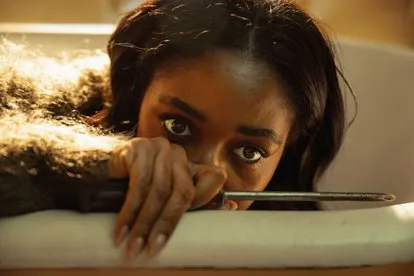
Do even a cursory search online for reactions to A24s new thriller Opus, starring Ayo Edebiri and John Malkovich, and youll find many comments and reviews — dismissive or otherwise — referencing a slew of intellectualized, social-satire horror: movies like Midsommar, Blink Twice, and The Menu, to name just three of the dozens if not hundreds of films that have followed in the footsteps of Jordan Peeles genre-realigning masterpiece, Get Out.
And yes, Opus does bear a striking resemblance to those first three movies in particular. Its about travelers getting drawn into a cultish ritual under blazing sunlight, hangers-on falling into a wealthy celebritys nightmarish orbit, and an artist exacting cruel revenge on an audience that, to his mind, is not sufficiently appreciative. In the movie, a young magazine writer (Edebiri) travels with some other journos to the remote Utah ranch of a legendary pop star (Malkovich) to hear the new album with which he is about to end a 27-year silence. Naturally, things get weird.
The trailer, without revealing too much, leaves viewers under no illusion about the kind of movie they are about to see. You could likely call the major plot points without watching it. Opus, though it has some gory images and sudden reversals, is not a surprising film in the least; its deeply, but also satisfyingly, predictable. Its similarities to Midsommar, Blink Twice, and The Menu are not necessarily a sign of debut writer-director Mark Anthony Green borrowing too heavily from specific peers. To me, theyre a sign of this social-satire subgenre of horror — the one sometimes referred to, with either inverted snobbery or just plain snobbery, as “elevated horror” — settling into its own formulaic groove.
Photo: A24This obviousness might seem to be a problem for a breed of movie that tends to be marketed on its combination of satirical smarts and bitter social rectitude. After all, the promise of the elevated horror is that the audience gets to leave the theater feeling titillated but also smart and sorrowfully right about the world, and if the mechanics of the films point-making are too easy to see, it spoils the effect. Doesnt it?
Well, maybe. But its also true that genres are built on formula, and that formulas cant survive on subversion alone. They need repetition to work. Repetition, in fact, is the pleasurable basis of the vast majority of horror movies out there, and among the non-elevated kind — movies like, say, Heart Eyes, or Night Swim, or The Popes Exorcist — it is not seen as any kind of hindrance to a solid evenings entertainment.
Opus is no different, really. It is by no means a great movie. It isnt well paced; it commits the cardinal elevated-horror sin of divorcing its point-making, clever reveal from its bloody climax, so both land with half the impact they should. (Not a mistake made by The Substance, for example.) But it is a fun movie.
It has a fabulous cast, and an inherently entertaining premise, presumably based in Greens former life as a writer and editor for GQ. That would account for the wicked specificity with which Green picks apart the media types who feed off the scraps of true fame — people like Murray Bartletts cocksure but soft-soaping editor, or Juliette Lewis vain rock-chick interviewer, or Tony Hales preposterous hippie intermediary (who luxuriates in the name Soledad Yusef). They all spend the movie orbiting Malkvoichs Alfred Moretti, a reclusive giant of 1980s and 90s glam pop with a taste for outrageous costuming, existing somewhere in the possibility space between Lady Gaga and Elton John.
Photo: A24Moretti is a brilliant creation — and not just of Malkovichs typically precise wit and the inimitable, destabilizing cadence of his line readings. Green enlisted legendary producer Nile Rodgers and songwriter The-Dream (who co-wrote, among many other things, “Single Ladies (Put a Ring on It)” and “Umbrella”) to write tracks for Morettis new album, as well as his 90s hit “Dina Simone.” These songs are credible bangers that establish Moretti as a true genius within the films world — a rare achievement for a movie about pop music, without which Opus wouldnt work half as well.
For anyone with an interest in music or pop culture journalism, theres a lot to enjoy in Opus. Maybe Green had a record-industry satire in him that didnt need to go down this well-worn horror route, but thats not how first-time filmmakers get their scripts made these days. And anyway, watching a filmmaker fit their preoccupations into the smooth, reassuring contours of genre is one of the great pleasures of the movies. Maybe Opus, and other derivative but fun movies like it, put the lie to the pretense that their social-satire subgenre is more substantive than the rank-and-file horror it feeds off. And maybe thats not such a bad thing.
